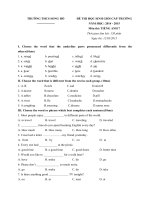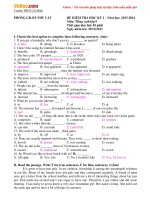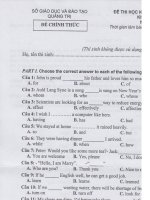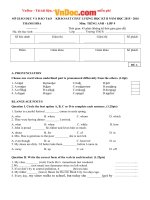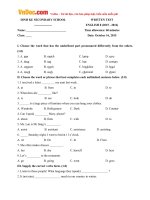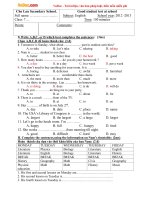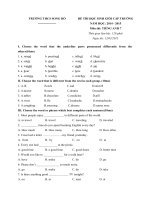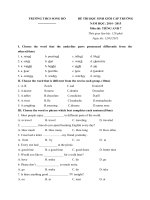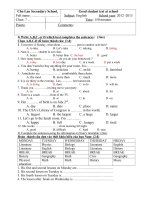- Trang chủ >>
- Đề thi >>
- Đề thi lớp 9
Đề thi học sinh giỏi môn Tiếng Anh lớp 9 trường THCS Nam Toàn, Nam Định năm 2015 2016
Bạn đang xem bản rút gọn của tài liệu. Xem và tải ngay bản đầy đủ của tài liệu tại đây (144.44 KB, 8 trang )
PHÒNG GD - ĐT NAM TRỰC
TRƯỜNG THCS NAM TOÀN
ĐỀ KHẢO SÁT CHẤT LƯỢNG HSG CẤP TRƯỜNG
NĂM HỌC 2015 - 2016
MÔN: TIẾNG ANH 9
(Thời gian làm bài: 120 phút không kể thời gian giao đề)
SỐ PHÁCH
Họ và tên: ………………………………………………….…
Lớp:............. Phòng thi: …… Số báo danh: …………..
Trường: ………………………………………….….
________________________________________________________________
SỐ PHÁCH
Điểm thi: …………….....
Bằng chữ: ………………
Giám khảo 1:……………………
Giám khảo 2: ……………………
PHONETICS:
Question I: Choose one word that is pronounced differently from the others in each
group by circling the letter (A, B, C or D). (1 point)
1. A. town
B. how
C. grow
D. cow
2. A. exciting
B. bridge
C. combine
D. die
3. A. washed
B. worked
C. watched
D. naked
4. A. card
B. dark
C. adventure
D. harvest
5. A. notice
B. shoping
C. topic
D. crossing
II. Circle the word which has the different stressed syllable with the others. (1 point)
1. A. picnic
B. fishing
C. movie
D. Arrive
2. A. homeless
B. serious
C. become
D. weather
3. A. notice
B. peaceful
C. region
D. divide
4. A. finish
B. design
C. control
D. provide
5. A. paper
B. tonight
C. lecture
D. story
VOCABULARY AND GRAMMAR
Question I: Choose the best answer to complete the following sentenses.(2 points)
1. How many people took part.............. the contest?
A. in
B. from
C. with
D. to
2. I am better........................ English than Nam.
A. than
B. with
C. at
D. for
3. You will not pass the exam......................... working harder.
A. unless
B. without
C. if
D. although
4. It was raining very......................... so I had to wear my raincoat.
A. wet
B. bad
C. hard
D. heavy
5. Mr Dung said he.............................. 35 the following week.
A. was
B. is
C. will be
D. would be
6. Don’t let the good chance go.........................
A. by
B. on
C. over
D. off
7. I wish I................................. to him. Now it’s too late.
A. listened
B. has listened
C. had listened
D. would have listene
8. Noone knows her name, ………………?
A. is he
B. don’t they
C. isn’t he
D. do they
9. The man................. our teacher is taking to is the headmaster of our school.
A. who
B. which
C. whom
D. whose
10. What is............., a dog or a cat?
A. intelligent
B. more intelligent C. as intelligent D. the most intelligent
Question II: Supply the corect form of the verbs in the brackets. (2 points)
1. His hair is short. He (have) ……………….his hair cut yesterday.
2. He said that he (see)………………….. that man before.
3. If today (be)…………………. Sunday, we would go on a picnic.
4. I hope the dog (feed)………………. well.
5. This house didn’t use to (paint)……………….. green.
6. My father told me (not stay)…………….. up too late.
7. She wishes she (be) ………………… better tomorrow.
8. The rooms in this hotel (clean)……………. every day.
9. When I met him, he (talk) to his friends in the bookstore.
10.It’s ages since I last (have)…………….. Chiness food.
Question III: Supply the correct form of the words in brackets. (2 points)
1. This dictionary is not so big but it is...................
(inform)
2. She looks.................... in her new dress.
(attract)
3. The................... have to cook rice in this contest.
(participate)
4. Old people often have............................ in breathing.
(difficult)
5. There were two.................. yesterday: Boxing and Swimming.
(compete)
6. I don’t think she has the................... to do this work.
(able)
7. How...................... of you to break that glass!
(care)
8. Some of my............ live in a village outside Thanh Hoa city.
(relate)
9. The house is large but it is terribly ................... to live in.
(comfort)
10. We should learn about keeping our environment...................
(pollute)
READING COMPREHENSION:
Question I: Fill in each numbered blank with one suitable word. (2 points)
Dear Thuy,
We are having an.......(1)..... time in Hoi An. The streets here are so....(2)...... that cars
are not allowed to the center of the...(3).....Therefore we have to....(4).......The houses are
very....(5)..... but beautiful. However, I don’t like the way they do business here. It
seems that every house has a shop to sell........(6)...... and other stuffs. The people are
very.....(7)...... and helpful. The food looks funny but it.....(8)...... quite nice. I haven’t....
(9)...... anything for you. But I will buy you some little....(10)...... lanterns.
See you nextweek.
Love,
Mathew.
Question II: Read the passage, then choose the best answer for each question. (2
points)
CHRISTMAS.
Two popular traditions at Christmas are: decorating the home and singing the
Christmas carols. The home is the center of the Christmas celebration.Inside, an
evergreen tree is usually placed in the corner of the Living room.Children and their
parents wrap string of colorful lights around the tree, they hang ornaments on the
branches. A star or angle often crowns the top. Careful- wrapped gifts are placed
beneath. Outside, families often string lights around the windows and wind light around
trees and shrubs in the front yard. As the families decorate their homes, they often put on
Christmas record. Almost every family has at least one favorite album or compact disc.
School children of all ages perform Christmas concerts for their parents and
communities. On Christmas’ Eve, family members gather around Christmas tree to sing
traditional songs Such as Jingle bells and Silent night and then give presents to each
other.
1. What are the popular traditions at Christmas?
a) Decorating the home.
b) Singing Christmas carols.
c) Eating Christmas pudding.
d) a and b are correct.
2. Where is the evergreen put?
a) In the middle of the livingroom.
c) In the middle of the bedroom.
b) In the corner of the livingroom.
d) In the corner of the bedroom.
3. How do they decorate the Christmas tree?
a) They wrap string of colorful lights around the tree.
b) They hang ornaments on branches
c) They crown a star on the top.
d) a, b and c are correct.
4. What do the family members often do on Christmas’ Eve?
a) They gather around Christmas tree.
b) They sing traditional songs.
c) They gather around the tree,sing traditional song and get presents
d) They give presents to each other.
5. What do they do as they decorate their home?
a) They sing traditional songs.
c) They eat Christmas pudding.
b) They put on Christmas record.
d) a, b and c are correct.
Question III: Read the passage and decide which answer A, B, C or D best fits each
space. (2 points)
I live in a small village (1)____ Henfield - there are about 500 people here. I love it
because it is (2) ____ and life is slow and easy. You never (3) ____ queue in shops or
banks. The village is clean - people (4) ____ it and don’t throw their rubbish in the
streets. The air is also (5) ____ because there’s not much heavy traffic. It’s much more
(6) ____ here than in a city. Everyone knows everyone and (7) ____ someone has
problem, there are always people who can help.There aren’t (8) ____ things I don’t like
about Henfield. One thing is that there’s not much (9) ____ in the evening - we haven’t
got any cinemas or theaters. Another problem is that people always talk about (10) ____
and everyone knows what everyone else is doing. But I still prefer village life to life in a
big city.
1. A. was
B. is
C. called
D. name
2. A. quietly
B. quiet
C. noisy
D. noisily
3. A. had
B. should
C. wait
D. have to
4. A. look after
B. find
C. think
D. look for
5. A.dirty
B. not clean
C. clean
D. dizzy
6. A. friendly
B. unfriendly
C. boring
D. uninteresting
7. A. if
B. and
C. so
D. but
8. A. much
B. a little
C. a few
D. many
9. A. doing
B. to do
C. jobs
D. things
10. A. another
B. every one
C. each other
D. any one
WRITING:
Question I: Rewrite the following sentences so that they stay the same meaning as the
first one. (2 poinst)
1. A painter painted our house last month
- We had ........................................................................................................................
2. Who wrote this story?
- By ................................................................................................................................?
3. I have never seen a more beautiful house than this.
- This .............................................................................................................................
4. “ Do you have to do your homework tonight?”, she said to me
- She asked ...................................................................................................................
5. I don’t have a bigger problem than listening.
- My ...............................................................................................................................
6. “Why don’t we go out for a walk?”
- My father suggested ...................................................................................................
7. We couldn’t drive fast because of the fog.
- The fog prevented ......................................................................................................
8. Unless he phones immediately, he won’t get any information.
- If .................................................................................................................................
9. Nobody gave me any presents for my birthday.
- I ..................................................................................................................................
10. It’s a pity I didn’t go with her last night.
- I wish ..........................................................................................................................
Question II. Use the suggested words to write meaningful sentences. (2 points)
1. He/ ill/ so/ he/ couldn’t/ get up.
- ……………………………………………………………………………………………
2. What/ Mr. Brown/ do/ living/ town?
- ……………………………………………………………………………………………
3. Many Hanoi people/ go/ countryside/ weekends/ have/ rest. `
- ……………………………………………………………………………………………
4. We/ wish/ there/ be/ more/ fresh air/ city/.
- ……………………………………………………………………………………………
5. Liz/ look forward/ hear/ friend in Britain/ soon/.
- ……………………………………………………………………………………………
6. We/ not used/ wear/ jeans/ when/ study/ primary school.
- ……………………………………………………………………………………………
7. A new style/ clothes/ design/ his shop/ every week.
- ……………………………………………………………………………………………
8. Wear/ uniforms/ encourage/ students/ proud/ school.
- ……………………………………………………………………………………………
9. sister/ wear/ new ao dai/ only twice/ since/ she/ buy/ it.
- ……………………………………………………………………………………………
10. Ba/ said/ buy/ new dictionary/ following day.
- ……………………………………………………………………………………………
Question III. Write a paragraph of about 100 words that you support the argument
that secondary school students should wear uniforms when they are at school. (2
points)
……………………………………………………………………………………………
……………………………………………………………………………………………
……………………………………………………………………………………………
……………………………………………………………………………………………
……………………………………………………………………………………………
……………………………………………………………………………………………
……………………………………………………………………………………………
……………………………………………………………………………………………
……………………………………………………………………………………………
THE END
ĐÁP ÁN - BIỂU ĐIỂM
PHONETICS:
Question I: Choose one word that is pronounced differently from the others in each
group by circling the letter (A, B, C or D). (1 point)
1-C
2-B
3-D
4-C
5-A
II. Circle the word which has the different stressed syllable with the others. (1 point)
1-D
2-C
3-D
4-A
5-B
VOCABULARY AND GRAMMAR
Question I: Choose the best answer to complete the following sentenses. (2 points)
1- A
2-C
3-B
4-C
5-D
6-A
7-C
8-D
9-C
10 - B
Question III: Supply the corect form of the verbs in the brackets. (2 points)
1. had
6. not to stay
2. had seen
7. would be
3. were
8. are cleaned
4. will be fed
9. was talking
5. be painted
10. had
Question III: Supply the correct form of the words in brackets. (2 points)
1. informative
6. ability
2. attractive
7. careless
3. participants
8. relatives
4. difficulty
9. uncomfortable
5. competitions
10. unpolluted
READING COMPREHENSION
Question I: Fill in each numbered blank with one suitable word. (2 points)
1. great/ wonderful/ excellent/ interesting 6. souvernirs
2. narrow
7. friendly
3. town
8. is/ tastes
4. walk
9. bought
5. old
10. colorful
Question II: Read the passage, then choose the best answer for each question. (2
points)
1-d
2-b
3-d
4-c
5-b
Question III: Read the passage and decide which answer A, B, C or D best fits each
space. (2 points)
1-C
6-A
2-B
7-A
3-D
8-D
4-A
9-B
WRITING
5-C
10 - C
Question I: Rewrite the following sentences so that they stay the same meaning as the
first one. (2 points)
1. We had our house painted last month.
2. Who wrote this story?
2. By whom was this story written?
3. This is the most beautiful house I have ever seen.
4. She asked me if I had to do my homework that night.
5. My biggest problem is listening.
6. My father suggested going out for a walk.
7. The fog prevented us from driving fast.
8. If he doesn’t phone immediately, he won’t get any information.
9. I wasn’t given any presents for my birthday.
10. I wish I had gone with her last night.
Question II. Use the suggested words to write meaningful sentences. (2 points)
1. He was ill, so he couldn’t get up.
2. What does Mr. Brown do for his living in town?
3. Many Hanoi people go to the countryside on the weekends to have a rest.
4. We wish there were more fresh air in the city.
5. Liz looks / is looking forward to hearing from her friend in Britain soon.
6. We didn’t use to wear jeans when we studied at primary school.
7. A new style of clothes is designed in / for his shop every week.
8. Wearing uniforms encourages students tobe proud of their school.
9. My sister has worn her new aodai only twice since she bought it.
10. Ba said he would buy a new dictionary the following day.
Question III. Write a paragraph of 100 words that you support the argument that
secondary school students should wear uniforms when they are at school. (2 points)
- Introduction: 0.4
- Arguments: 3 x 0.4
- Conclusion: 0.4
I think / My opinion is ..................................................................................................
Firstly, ...........................................................................................................................
Secondly, .......................................................................................................................
Finally, ..........................................................................................................................
In conclusion, / Therefore, ............................................................................................
MA TRẬN ĐỀ
Chñ ®Ò
I. Phonetics
II. Grammar,
Vocabulary
II. Reading
NhËn biÕt
TN
TL
10
2p
10
2p
Th«ng hiÓu
TN
TL
VËn dông
TN
TL
Tæng
10
2p
20
30
4p
15
10
4p
IV. Writing
6p
25
2p
6p
20
4p
100
words
2p
Tæng
20
45
4p
20
4p
100
words
2p
20
85
10p 100 words
+ 100
6p words
20p

